Brief • 3 min Read

The MacArthur Foundation teamed up with The Harris Poll to see how Chicagoans’ perspectives on public safety in Chicago have changed since we first explored the topic in Q1 2021. What we found is a city still troubled by gun violence and an uptick in local crime coupled with increasing anxiety about police interactions among young residents and those of color.
Attitudes towards solutions addressing these issues remain nuanced and divided along racial, socioeconomic, and generation lines as well as lived experiences. Even so, Chicagoans still desire changes to the laws, systems, and organizations that contribute to and help prevent the violent crime plaguing the city.
Revisiting Key City Concerns
Today, most residents still do not agree Chicago has a strong sense of community and have not seen improvements in race relations. They agree even more often that such issues are systemic. Additionally, they express increasing concern about police-resident relations in the city.
Because public safety can support the sense of community and protection residents feel, it is important to look at how Chicago area residents feel about the current condition of their city. Similar to what we learned in Q1 2021, residents are still fairly divided on if Chicago has a strong sense of community (only 47% agree it does), and they continue to perceive a decline in local race relations.
Seventy-eight percent disagree that race relations in Chicago are good right now, and 71% also disagree that compared to this time last year, race relations have improved. For both sentiments, this represents an uptick of 5% from six months ago.
Even more Chicago residents also view the city’s race issues as systemic. Nearly two-thirds (63%) of residents disagree that “race-related issues in Chicago are due to a few bad actors, not systemic issues.” This sentiment has also increased 6% over the last six months.
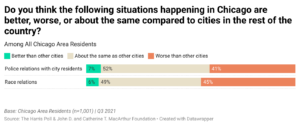
About half of all Chicago residents view race relations and police-resident relations as on par with other U.S. cities, but there is a large and growing plurality that see room for improvement. We can see this come into play when we look at how residents describe police and race relations compared to other cities in the U.S.
Today, even fewer residents think that race and police relations are better in Chicago than in other U.S. cities. While half of all residents still say race and police relations are on par with other cities, there is a growing plurality that think both overall race relations and police-resident relations are becoming worse in Chicago than in other parts of the country (up 3% for both situations).
Overall sense of neighborhood safety is still moderately high among residents, but there are also safety concerns regarding vulnerable communities in Chicago.
On a scale of 0 to 10, all Chicago area residents give their neighborhoods an average safety score of 7.03. However, if we look at different sections of the Chicagoland area, we can see with more detail that safety levels increase as one lives further from the city itself. More specifically, city residents consistently report lower safety levels than the Chicagoland average. Those living in the suburbs consistently report moderately high levels of safety, but as the middle ground between the city and the outlying suburbs, residents of Cook County suburbs report some of the lowest levels of neighborhood safety for suburban residents.
Unsurprisingly, residents report high levels of concern about the personal safety of historically marginalized communities like the homeless (85%), residents of color (83%), and residents with mental or behavioral health conditions (87%). Such concern indicates that current support systems in place may not be effectively protecting and promoting people in need.
Although concern for the vulnerable or potentially vulnerable is high across all residents, such concern is especially high among younger adults and African Americans. This could be due to a variety of factors, such as closer proximity to these communities given housing locations, the fact that these segments over-index on social consciousness, or increased experience mental health issues compared to their counterparts that influences comfort with expressing support for those suffering from similar situations.**
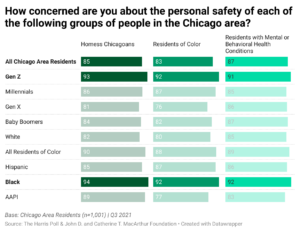
Residents also take a critical view of the city leadership’s efforts to support the marginalized neighborhoods.
Compared to 6 months ago, residents are no longer equally divided on whether city leadership* has done a good job of investing in and supporting historically marginalized neighborhoods. Today, most residents (61%) disagree that it has done a good job. Consequently, more than four out of five residents (84%, up 4% from Q1 2021) continue to agree that city leadership could do more to tackle inequality across Chicago.
Nevertheless, when it comes to the city’s most important issues, gun violence remains the primary concern while racial concerns and social services increasingly take a back seat.
Today, 57% of all Chicago area residents say gun violence is the most important problem in Chicago today – an increase of 7% from six months ago and more than 5 times higher than the next mentioned problem, property taxes.
In fact, gun violence is followed by more financial concerns such as property taxes and economic inequality. Perhaps surprisingly, despite increased local news regarding resident maltreatment by police, police treatment of Black and Latino residents is now perceived as less of a priority by city residents when compared to other local issues.
Given climbing crime rates during the summer of 2021, it’s unsurprising that 81% of area residents feel gun violence is worse in Chicago than in other U.S. cities (up 6%). This is higher than how residents feel about other trending crimes in the city, such as carjackings (76% say this is worse in Chicago than other cities), other violent crimes (63%), and non-violent crimes (42%).
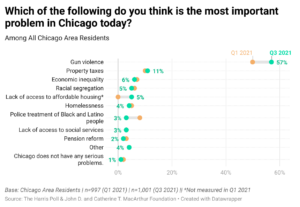
Priority #1: Tackling Gun Violence
So how does the city increase the sense of safety, especially with regards to gun violence? Today, Chicago residents show increased support for solutions related to legislation, law enforcement involvement, and some neighborhood level support programs.
When considering solutions related to legislation, among those who agree gun violence needs to be reduced in Chicago, there is a slight uptick in those who perceive background checks (65%, up 2%), higher penalties for gun-related crimes (64%, up 4%), and red flag laws/extreme risk protection orders (50%, up 6%) as effective gun violence reduction tactics.
Initiatives that require the involvement of law enforcement are also perceived as effective by most residents today. More specifically, there has been a slight uptick in those supporting police presence in areas with high gun violence (58%, up 3%) and police engagement with residents in areas with high gun violence (51%, up 3%).
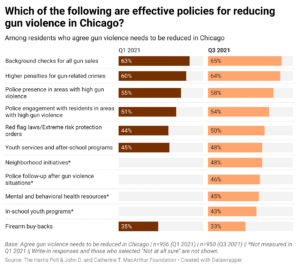
Neighborhood-level and city-level support programs are currently only perceived as effective by approximately two in five residents that agree gun violence needs to be reduced in Chicago.
Ultimately, this reveals that where gun violence is concerned, residents want to see visible, direct solutions used as a first line of defense to deal with gun violence, namely the law and law enforcement.
Struggling to Progress: Assessing Chicago Police Performance
Overall, most area residents still think that police officers are doing their job well. That said, given the controversy regarding police treatment of protestors during Summer 2020 and ongoing stories of the mistreatment of city residents, confidence in the force has ebbed over the last six months.
Sixty-one percent of all residents say that members of the CPD are handling their job well (down 2%). However, when looking at perceived effectiveness with crime, while the majority still feel police are effective at handling crime, the share of those who do not feel the police are effective at resolving crime in their neighborhoods and the city has grown (44%, up 7%; and 47%, up 5%, respectively).
This varied sense of effectiveness is reflected in the level of trust some residents have in the police. On average, trust in the police remains moderate among Chicago residents. On a scale of 0 to 10, resident trust in the police averages at a 6.2 out of 10, which is a minor overall increase from Q1 2021. That said, broader plans in trust rating are still similar to Q1 2021: older generations, White residents, and suburban residents give higher scores than their counterparts.
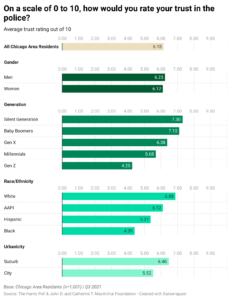
Though lower in trust compared to their ethnic counterparts, there have also been minor upticks in the sense of trust Hispanic and African American residents have in the police. Part of this is because while 21% of African Americans and 13% of Hispanics said they had no trust (0 out of 10) in police in Q1 2021, in Q3 2021 this “no trust” percentage has fallen to 11% of African Americans and 10% of Hispanics.
One reason for these minor upticks law enforcement ratings may be that residents have found a new enemy: local crime. With crime rates increasing, residents may trust police more because there is no one else to trust for dealing directly with these issues.
Despite moderate trust and anticipated respect overall, compared to six months ago, more residents report negative experiences with police and even greater anxiety towards reporting police misconduct for fear of retaliation.
Most Chicagoans are still confident the police would treat them with respect in a hypothetical interaction (though this has dipped slightly from 78% to 75%). However, when it comes to actual ratings of how respectful police officers are to them, Hispanic and AAPI (Asian American and Pacific Islander) residents report declines in officer respect ratings. Broader plans in respect rating also are similar to Q1 2021, that being, older generations, White residents, and suburban residents give higher scores than their counterparts.
This comparative anxiety among ethnic minorities regarding trust and current and anticipated respect appear well-founded based on experiences over the last six months. In Q1 2021, 16% of all residents said they had had a negative experience with a member of the CPD. In Q3, this is now 23%, pointing to indicating a likely increase in resident interactions with the police during Summer 2021. Digging deeper, just 14% of White residents say they have had a negative experience with a member of the CPD (up 6%), but this is even higher for residents of color at 37% (up 12%).
Moreover, the share of residents that say they have been racially profiled in at least one interaction with police officers in Chicago has increased from 11% to 17% over the last six months.
There is also greater anxiety towards reporting police misconduct for fear of retaliation. Today, nearly two in five residents (39%) say that if they were to report police misconduct to the Chicago Police Department, they believe they would receive retaliation from officers for filing a complaint; this is more than double the share who felt this way in Q1 2021. Looking at racial experiences again, compared to a quarter (28%, up 18%) of White residents who hypothetically fear retaliation from reporting misconduct, it’s nearly twice the rate for people of color (55%, up 35%).
A similar trend exists for those who have been afraid to report actual police misconduct (23% of all residents, up 12%; 14% for White residents, up 9%; 35% for residents of color, up 17%).
In fact, one in five Chicago residents (21%) say they have felt the need to intervene or observe the interactions between a Chicago police officer and a resident at some point.
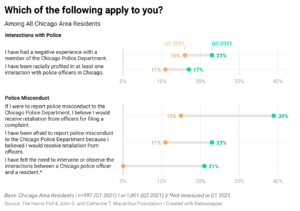
This reveals that while Chicago leadership has tried to curb violence by pushing police presence in the city, it has also increased the potential for negative incidents, racial profiling, and the suppression of misconduct reports.
What this makes especially clear is that there is a nuanced reaction to how residents perceive police presence, especially given the targeted increase in police during the summer months. The presence or idea of increased police force may make residents feel safer and increased leadership attention may make some feel more hopeful that the police will treat them with respect and are therefore, worthy of trust. However, when it comes to in-person reactions, it seems many residents, especially those of color, feel they still have a reason to be cautious.
Still a Worthwhile Cause: Pursuing Public Safety Solutions for Chicago
About three quarters of all area residents still agree Chicago law enforcement needs reform. When looking at how residents want to see law enforcement change, it appears the focus is still less about the money given to the department and more about how people want the department to invest in change.
When residents were asked again what law enforcement reform would look like to them, training changes still came out as the tactic most residents want to see implemented. They show especially increased support for sensitivity training for all officers (56%, up 7%).
New policies on gun use (50%) and the introduction of social workers (50%) also saw a 9% increase in support compared to six months ago.
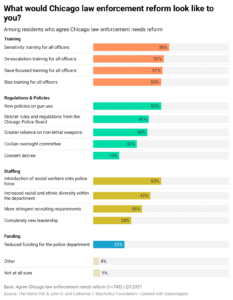
Again, as evidenced with funding reduction at the bottom of the chart above, although the policy has seen some increase in support (up 3%), residents still appear less focused on taking money away or redistributing police funds. They appear more concerned about how current police funds can be used more effectively to create a police force that residents believe in and trust to protect them.
It makes sense, then, that while residents don’t see the department as over-funded, they do still think that there should be more funding for non-policing alternatives.
Most still do not see the current level of funding for the Chicago Police Department as too high, but three-quarters of all residents still agree there should be more funding for non-policing alternatives, such as social work dispatches, neighborhood patrols, and restorative justice circles.
Again, it appears that Chicago residents want more money going to non-policing alternatives, but reducing police department funding – though a potentially effective tactic to them – is not necessarily the primary tactic they would like to use for ensuring non-policing alternatives are financially supported.
That being said, there has been an increase in those supporting the reallocation of police funding. When thinking about police budget reallocation and the funding of social and non-police public safety services, it’s very clear that, framing matters.
Currently, most Chicago residents are still opposed to the specific “Defund the Police” campaign (only 46% support it).*** However, there has been some uptick in support across various resident segments. What’s more interesting is that when asked if they simply support police budget reallocation to underserved social services, most Chicago residents are actually in support of the initiative (56%).****
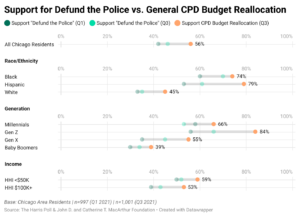
Knowing that residents prioritize training as an opportunity to improve the Chicago police force, we also examined how they feel about officers’ training in some key public safety situations.
Overall, residents consider officer training in various public safety situations to be middling; on a scale from 1 to 5, residents’ perception of officers typically averages out around a 3.
Most residents think officers are best trained for responding to domestic safety and personal safety concerns, like stalking, harassment, or even physical fights. The net share of those who think CPD training for such issues is excellent or good is close to 40%.
On the other hand, residents see the most room for training improvements in issues related to cultural awareness and working with residents with mental or behavioral health issues. In fact, specifically regarding mental health concerns, two in five residents think that officers have been poorly trained – which may be one reason why half of residents who support law enforcement reform would like to see social workers integrated into the department.
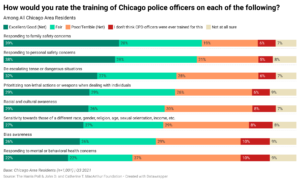
Even so, Chicago residents do realize that no one team – including the CPD – is equipped to handle every urgent situation in the city.
In general, situations perceived to be high risk – those that involve an immediate threat to someone’s physical safety or the law itself – are those that residents want to be primarily addressed by CPD. However, as the primary concern becomes more focused more on residents’ wellbeing, most residents would prefer that CPD play a less significant role.
Taking a closer look, 71% of residents believe that officers should be all or mostly responsible for responding to reports of suspicious behavior (e.g., trespassing, loitering, unfamiliar, vehicles). Nearly as many (69%) feel the same about situations involving personal safety concerns (e.g., physical fights, harassment, stalking). Most residents (61%) also believe that officers should be all or primarily responsible for neighborhoods concerns like noise complaints or disorderly conduct.
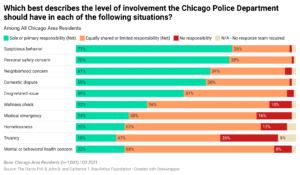
Still, emergency calls are rarely so cut-and-dry. In those highly variable situations – issues like domestic disputes or drug-related activity – there’s a clear call for balance. In some of those more complicated situations, social services teams are viewed as valuable alternative resources.
Digging deeper into some of these more personal issues, social services are frequently selected as who should share responsibility with police or have the primary or sole responsibility instead of police. We see this with domestic disputes (59%), drug related issues (49%), wellness checks (60%), and mental health concerns (78%).
Looking Ahead
As 2021 draws to a close, the story of public safety in Chicago remains largely the same: solutions to key city issues like gun violence and police treatment start with leadership and reform. What has changed is the sense of urgency that residents feel about such issues.
Chicago leadership has tried to curb violence by pushing police presence in the city during the summer months, but this has also increased the level of negative incidents and nuanced fears about local law enforcement.
Despite concerns about police-resident relations, Chicago area residents still prioritize more direct tactics – the law and law enforcement – as the most effective ways for dealing with gun violence and other crimes. However, this may simply be because residents have yet to find a better alternative for dealing with crime than the police.
Therefore, residents support reform for public safety in Chicago and see training improvements, new regulations, staffing updates, and – to a lesser degree – funding redistribution as tactics for creating such reform. Moreover, compared to six months ago, they show greater enthusiasm for several reform measures – most noteworthy, police budget reallocation to essential, underfunded social services like mental healthcare programs, youth services, homeless services, and affordable housing efforts.
Want to learn more about this research? Check out CEO Will Johnson’s Op-ed in the Chicago Tribune featuring this data.
Research Notes
*In the survey, “Mayor Lori Lightfoot” was used in the questions answered by respondents.
**These suggestions, though informed, should be treated as speculative instead of conclusive.
***Note, this was measured in September 2021. This number is an aggregate, weighted value of all Chicago area (both city and suburb) residents. Support and opposition for Defund the Police varies by specific demographics, such as race/ethnicity, age, urban level, and household income. Before indicating their support or opposition, residents were given a brief description of Defund the Police: “Perhaps you have heard of the campaign ‘Defund the Police,’ which refers to the movement to reduce police department budgets and redistribute those funds towards essential social services that are often underfunded, such as housing, education, employment, mental health care, and youth services. Given this understanding, how much do you support or oppose this campaign?”
****This number is an aggregate, weighted value of all Chicago area (both city and suburb) residents. Support and opposition for Defund the Police varies by specific demographics, such as race/ethnicity, age, urban level, and household income. Before indicating their support or opposition, residents were given a brief description of the initiative: “In an effort to support essential social services that are often underfunded – such as housing, education, employment, mental health care, and youth services – there have been proposals to reduce police department budgets and redistribute those funds towards these essential social services. How much do you support or oppose such proposals?”
Methodology
This survey was conducted online within the United States between September 14, 2021, and September 21, 2021, among 1,001 adults (aged 18 and over) in the Chicago DMA by The Harris Poll on behalf of the John D. and Catherine T. MacArthur Foundation. The Q1 2021 survey was conducted online within the United States between March 1, 2021, and September March 12, 2021, among 997 adults (aged 18 and over) in the Chicago DMA. Figures for age, sex, race/ethnicity, education, region, and household income were weighted where necessary to bring them into line with their actual proportions in the population. Propensity score weighting was used to adjust for respondents’ propensity to be online.
All sample surveys and polls, whether or not they use probability sampling, are subject to multiple sources of error which are most often not possible to quantify or estimate, including sampling error, coverage error, error associated with nonresponse, error associated with question wording and response options, and post-survey weighting and adjustments. Therefore, the words “margin of error” are avoided as they are misleading. All that can be calculated are different possible sampling errors with different probabilities for pure, unweighted, random samples with 100% response rates. These are only theoretical because no published polls come close to this ideal.
Respondents for this survey were selected from among those who have agreed to participate in our surveys. The data have been weighted to reflect the composition of Chicago’s adult population. Because the sample is based on those who agreed to participate in the online panel, no estimates of theoretical sampling error can be calculated. For more information on methodology, please contact Dami Rosanwo or Madelyn Franz.
For more information on The Harris Poll’s partnership with the MacArthur Foundation, please contact Kristen Mack.
Subscribe for more Insights
Subscribe to our newsletter for the latest trends in business, politics, culture, and more.
Download the Data
Get the full data tabs for this survey conducted online within the United States by The Harris Poll on behalf of the John D. and Catherine T. MacArthur Foundation between September 14-21, 2021, among 1,001 U.S. adults ages 18 and older.
Download
Subscribe for more Insights
Subscribe to our newsletter for the latest trends in business, politics, culture, and more.
Download the Data
Get the full data tabs for this survey conducted online within the United States by The Harris Poll on behalf of the John D. and Catherine T. MacArthur Foundation between September 14-21, 2021, among 1,001 U.S. adults ages 18 and older.
DownloadRelated Content








